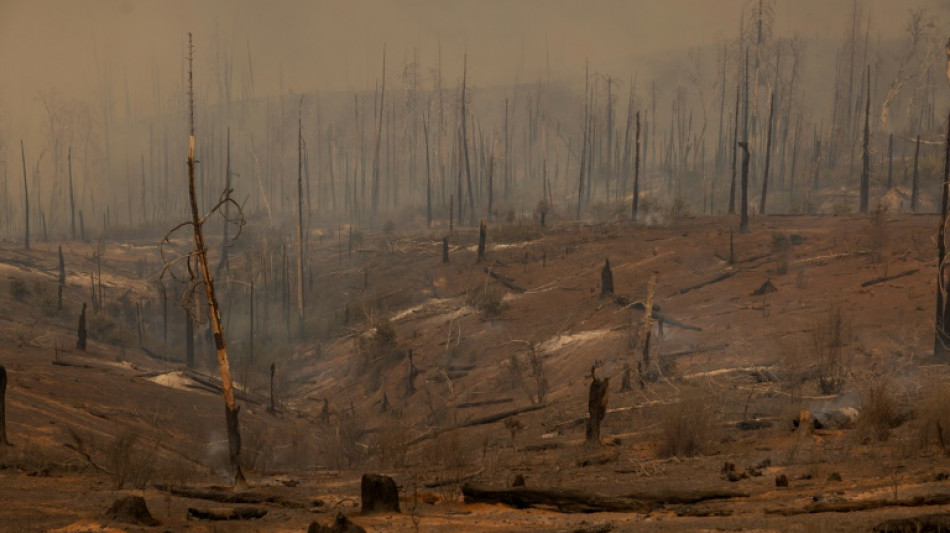
-
 Health concerns swirl as Bolivian city drowns in rubbish
Health concerns swirl as Bolivian city drowns in rubbish
-
Syria says deadly Israeli strikes a 'blatant violation'

-
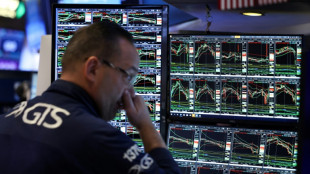 Financial markets tumble after Trump tariff announcement
Financial markets tumble after Trump tariff announcement
-
Starbucks faces new hot spill lawsuits weeks after $50mn ruling

-
 Europe riled, but plans cool-headed response to Trump's tariffs
Europe riled, but plans cool-headed response to Trump's tariffs
-
'Shenmue' voted most influential video game ever in UK poll

-
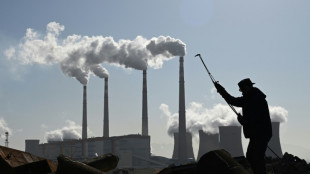 New coal capacity hit 20-year low in 2024: report
New coal capacity hit 20-year low in 2024: report
-
Revealed: Why monkeys are better at yodelling than humans

-
 Key details on Trump's market-shaking tariffs
Key details on Trump's market-shaking tariffs
-
'A little tough love': Top quotes from Trump tariff talk

-
 US business groups voice dismay at Trump's new tariffs
US business groups voice dismay at Trump's new tariffs
-
Grealish dedicates Man City goal to late brother

-
 US tariffs take aim everywhere, including uninhabited islands
US tariffs take aim everywhere, including uninhabited islands
-
Trump sparks trade war with sweeping global tariffs

-
 Israeli strikes hit Damascus, central Syria; monitor says 4 dead
Israeli strikes hit Damascus, central Syria; monitor says 4 dead
-
Slot 'hates' offside rule that gave Liverpool win over Everton

-
 US stocks end up, but volatility ahead after latest Trump tariffs
US stocks end up, but volatility ahead after latest Trump tariffs
-
Barca oust Atletico to set up Clasico Copa del Rey final

-
 Mourinho grabs Galatasaray coach's face after losing Istanbul derby
Mourinho grabs Galatasaray coach's face after losing Istanbul derby
-
Grealish strikes early as Man City move up to fourth in Premier League

-
 Reims edge out fourth-tier Cannes to set up PSG French Cup final
Reims edge out fourth-tier Cannes to set up PSG French Cup final
-
Liverpool beat Everton as title looms, Man City win without Haaland

-
 Jota wins bad-tempered derby as Liverpool move 12 points clear
Jota wins bad-tempered derby as Liverpool move 12 points clear
-
Inter and Milan level in derby Italian Cup semi

-
 Stuttgart beat Leipzig to reach German Cup final
Stuttgart beat Leipzig to reach German Cup final
-
Trump unveils sweeping global tariffs

-
 Italian director Nanni Moretti in hospital after heart attack: media
Italian director Nanni Moretti in hospital after heart attack: media
-
LIV Golf stars playing at Doral with Masters on their minds

-
 Trump unveils sweeping 'Liberation Day' tariffs
Trump unveils sweeping 'Liberation Day' tariffs
-
Most deadly 2024 hurricane names retired from use: UN agency

-
 Boeing chief reports progress to Senate panel after 'serious missteps'
Boeing chief reports progress to Senate panel after 'serious missteps'
-
Is Musk's political career descending to Earth?

-
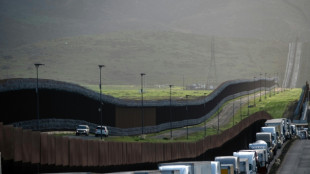 On Mexico-US border, Trump's 'Liberation Day' brings fears for future
On Mexico-US border, Trump's 'Liberation Day' brings fears for future
-
Starbucks faces new hot spill lawsuit weeks after $50mn ruling

-
 Ally of Pope Francis elected France's top bishop
Ally of Pope Francis elected France's top bishop
-
'Determined' Buttler leads Gujarat to IPL win over Bengaluru

-
 US judge dismisses corruption case against New York mayor
US judge dismisses corruption case against New York mayor
-
Left-wing party pulls ahead in Greenland municipal elections
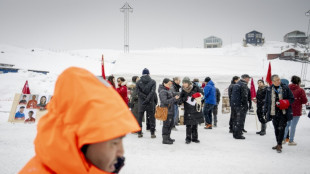
-
 Blistering Buttler leads Gujarat to IPL win over Bengaluru
Blistering Buttler leads Gujarat to IPL win over Bengaluru
-
Tesla sales slump as pressure piles on Musk

-
 Amazon makes last-minute bid for TikTok: report
Amazon makes last-minute bid for TikTok: report
-
Canada Conservative leader warns Trump could break future trade deal
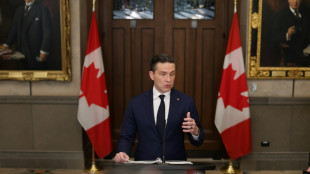
-
 British band Muse cancels planned Istanbul gig
British band Muse cancels planned Istanbul gig
-
'I'll be back' vows Haaland after injury blow

-
 Trump to unveil 'Liberation Day' tariffs as world braces
Trump to unveil 'Liberation Day' tariffs as world braces
-
New coach Edwards adamant England can win women's cricket World Cup

-
 Military confrontation 'almost inevitable' if Iran nuclear talks fail: French FM
Military confrontation 'almost inevitable' if Iran nuclear talks fail: French FM
-
US stocks advance ahead of looming Trump tariffs

-
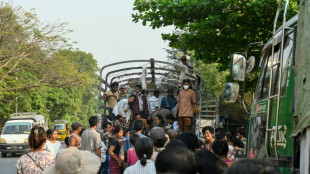 Scramble for food aid in Myanmar city near quake epicentre
Scramble for food aid in Myanmar city near quake epicentre
-
American Neilson Powless fools Visma to win Across Flanders


Scientists call for more research into 'climate endgame'
The world must prepare for a "climate endgame" to better understand and plan for the potentially catastrophic impacts of global heating that governments have yet to consider, scientists warned Tuesday.
Climate models that can predict the extent of global warming depending on greenhouse gas emissions are increasingly sophisticated and provide policymakers with an accurate trajectory of global temperature rises.
What is less well explored is the cascading impact of certain events, such as crop failures and infrastructure loss due to extreme weather events, which are made likelier to occur with every degree of warming.
Researchers at the University of Cambridge and the Potsdam Institute for Climate Impact Research (PIK) outlined what is currently known about "catastrophic outcomes" and found gaping knowledge gaps.
Writing in the journal the Proceedings of the National Academy of Science, they proposed an international research agenda to help governments plan for "bad-to-worst cases".
These included four main areas of concern -- what the authors termed the "four horseman" of climate change: famine and malnutrition, extreme weather, conflict, and vector-borne diseases.
"Irreversible and potentially catastrophic risks caused by human induced climate change must be factored into our planning and actions," said Johan Rockstrom, PIK director and a study co-author.
He said that the more research is done on Earth's climate tipping points -- such as the irreversible melting of the ice caps or the Amazon rainforest turning from a carbon sink to source -- showed the ever-greater need to factor in high-risk scenarios into climate modelling.
"Key is to do the math of disaster, in order to avoid it," he said.
- 'Mismatched caution' -
The authors pointed out that successive UN climate science reports have mainly focused on the predicted effects of 1.5C-2C of warming and largely discounted the possibility of more excessive temperature rises.
Government plans put Earth on course to rise as much as 2.7C this century, a far cry from the 1.5-C cap envisaged in the 2015 Paris climate accord.
The study suggested that a scientific disposition to "err on the side of least drama" led to a lack of focus on potential impacts at 3C of warming or higher.
"This caution is understandable, yet it is mismatched to the risks and potential damages posed by climate change," it said.
In addition, risk assessments for so-called low-likelihood, high-impact events are notoriously difficult to accommodate in long-term climate modelling.
The researchers calculated areas of extreme heat -- with an annual average temperature of over 29C -- could cover two billion people by 2070.
They warned that temperatures posed a major risk of multiple "breadbasket failures" due to drought such as that gripping western Europe and heatwave such as the one that hit India's wheat harvest in March/April.
The team called for a special UN science report focusing on "catastrophic climate change scenarios" similar to its 2018 report on 1.5C of warming.
"We have to get serious about understanding the profound risks that come with moving our planet into unknown territory," said Joeri Rogelj, director of research at Imperial College London's Grantham Institute, who was not involved in the study.
"Researching these extreme cases means that we'll be able to better prepare, including by being more serious about reducing emissions now."
C.Garcia--AMWN